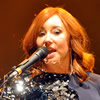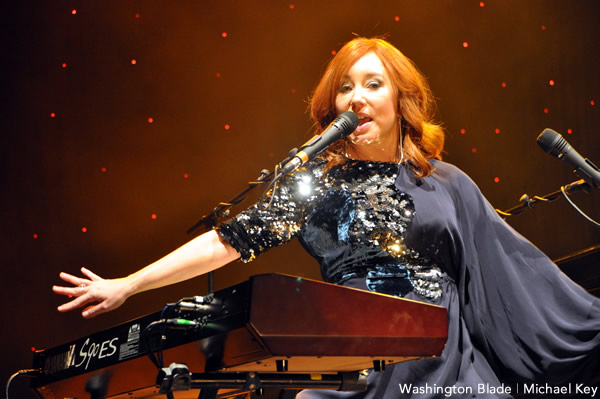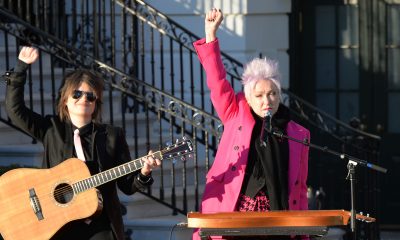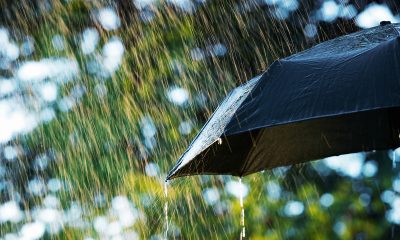Arts & Entertainment
Notes from the stage
Gays, allies worked the region with memorable concerts in 2011

Washington is always a big concert town — most major tours have stops here — but this year was especially teeming with gay and gay-friendly big-name musical acts. There was such an abundance of options, some evenings — like July 31 when Dolly Parton was at Wolf Trap and Britney Spears was at the Verizon Center or Sept. 1 when Stevie Nicks was at Jiffy Lube (Nissan) and Olivia Newton-John was in Baltimore — music fans had to make tough choices.
I didn’t get to everything but did see a lot. Among the highlights:
• Janet Jackson brought her “Up Close and Personal Tour” to DAR for two nights in March. Significantly scaled back from the previous “Rock Witchu Tour,” it was still a hits-packed extravaganza that followed her usual medley-heavy format. Glimpses of Michael — on duet “Scream” and in a childhood shot during “Together Again,” were especially poignant.
• A trim and svelte Jennifer Holliday (“Dreamgirls”) was here twice — she performed with the Gay Men’s Chorus of Washington June 4, then was back the next weekend to play Pride for a MIA Kelly Rowland. Her powerful, growl-heavy vocals were as solid as ever. She and the Chorus brought down the house with soulful covers of “Lean on Me” and “I Believe I Can Fly.” Rhianna was in Baltimore the same night.
• Gay crooner Michael Feinstein brought his booming baritone to the Kennedy Center in April for a delightful old-school-infused evening of standards, Sinatra and more.
• Also sporting a much-trimmer figure, Aretha Franklin played an odd-but-enjoyable Wolf Trap show June 21. That rainy, muggy night found the Queen ignoring all her trademark hits in favor of show tune covers (“As If We Never Said Goodbye” for one) and second-tier favorites (“Baby I Love You”). For long-time fans, it was a refreshing change of pace. First-timers were likely disappointed not to hear “Respect” and “Natural Woman.”
• Two local gay talents played cabaret shows at Signature Theatre in late July — Will Gartshore and Peter Fox and, while both good, were a study in contrasts. Gartshore’s booming voice carried an autobiographical show. Fox won the crowd over with his charm and unpretentiousness during a standards-heavy set.
• It was hard to tell how much of Dolly Parton’s “Better Days World Tour,” which stopped down at Wolf Trap in July, featured live singing but you have to give her this — at two-and-a-half hours, it was a generous evening that found the Blue Valley Songbird darting through covers (“River Deep Mountain High”), hits (“9 to 5,” “Islands in the Streams”), gospel, bluegrass and more.
• ‘90s hit-maker Joan Osborne was at the Birchmere in August with an unpredictable, eclectic 90-minute set. “Relish” classics (“One of Us” and “St. Theresa”) coalesced nicely with covers and lesser-known recent material.
• She doesn’t tear it up like she did in the old days, but what Stevie Nicks lacks in passion and grit, she’s made up for in pitch and finesse. Her “In Your Dreams Tour,” supporting her amazing 2011 new album (her first in a decade), found the Fleetwood Mac singer taking her time, giving her band plenty of chances to shine and balancing a wealth of cuts from the new album with trademark Mac and solo hits like barnburner “Edge of Seventeen” and “Rumors”-era wonder “Gold Dust Woman.”
• One of the year’s most exquisite musical moments was undoubtedly Patti LuPone’s simple one-woman cabaret show “Shoulda, Woulda, Coulda” at University of Maryland in early September. Wearing simple black, the stark stage featured only a Steinway grand, an adept accompanist, a vase of roses and LuPone’s undiminished talent. And with that kind of voice and interpretive skill, no other bells and whistles were needed. Knowledge of LuPone’s life and battles gave her cover of Sinatra’s “My Way” added subtext.
• Just weeks later, another Broadway legend — Audra McDonald — gave a similar show at the Kennedy Center. In fine voice, she focused on lesser-known (but hardly obscure) material and previewed her upcoming “Porgy and Bess.”
• Loretta Lynn, who’d canceled in the spring, made it to the 9:30 club in mid-October. Prospects were dicey — she’d been off the road most of the year and lost her voice halfway through the night before — but she delivered brilliantly, shared her trademark self-deprecating wit with the crowd and after a few songs, just took requests pretty much the rest of the night.
• Cyndi Lauper was back at the 9:30 club again this year just days after Lynn and tore through a ferocious 80-minute set on which she balanced smoldering blues classics from her latest album with fiery new arrangements of her trademark hits. The tour, albeit with an alternate set list, is out on DVD.
• Lesbian country singer Chely Wright sat on a bar stool two nights later at the Birchmere throughout a story-heavy set. It was as much “Storytellers” as concert but that worked — Wright, who just came out last year, has a lot to say. Occasionally long winded, the overall effect was greater appreciation for her life and songs.
Other acts that played the region this year included Lady Gaga, Kathy Griffin, Kylie Minogue, Scissor Sisters, Blondie, Indigo Girls, k.d. lang, Dave Koz (twice!), Pink Martini (twice!), Melissa Etheridge, Ani DiFranco, John Waters, Catie Curtis, Kate Clinton and more.
Books
Love or fear flying you’ll devour ‘Why Fly’
New book chronicles a lifetime obsession with aircraft

‘Why Fly’
By Caroline Paul
c. 2026, Bloomsbury
$27.99/256 pages
Tray table folded up.
Check. Your seat is in the upright position, the airflow above your head is just the way you like it, and you’re ready to go. The flight crew is making final preparations. The lights are off and the plane is backing up. All you need now is “Why Fly” by Caroline Paul, and buckle up.

When she was very young, Paul was “obsessed” with tales of adventure, devouring accounts written by men of their derring-do. The only female adventure-seeker she knew about then was Amelia Earhart; later, she learned of other adventuresome women, including aviatrix Bessie Coleman, and Paul was transfixed.
Time passed; Paul grew up to create a life of adventure all her own.
Then, the year her marriage started to fracture, she switched her obsession from general exploits to flight.
Specifically, Paul loves experimental aircraft, some of which, like her “trike,” can be made from a kit at home. Others, like Woodstock, her beloved yellow gyrocopter, are major purchases that operate under different FAA rules. All flying has rules, she says, even if it seems like it should be as freewheeling as the birds it mimics.
She loves the pre-flight checklist, which is pure anticipation as well as a series of safety measures; if only a relationship had the same ritual. Paul loves her hangar, as a place of comfort and for flight in all senses of the word. She enjoys thinking about historic tales of flying, going back before the Wright Brothers, and including a man who went aloft on a lawn chair via helium-filled weather balloons.
The mere idea that she can fly any time is like a gift to Paul.
She knows a lot of people are terrified of flying, but it’s near totally safe: generally, there’s a one in almost 14 million chance of perishing in a commercial airline disaster – although, to Paul’s embarrassment and her dismay, it’s possible that both the smallest planes and the grandest loves might crash.
If you’re a fan of flying, you know what to do here. If you fear it, pry your fingernails off the armrests, take a deep breath, and head to the shelves. “Why Fly” might help you change your mind.
It’s not just that author Caroline Paul enjoys being airborne, and she tells you. It’s not that she’s honest in her explanations of being in love and being aloft. It’s the meditative aura you’ll get as you’re reading this book that makes it so appealing, despite the sometimes technical information that may flummox you between the Zen-ness. It’s not overwhelming; it mixes well with the history Paul includes, biographies, the science, heartbreak, and exciting tales of adventure and risk, but it’s there. Readers and romantics who love the outdoors, can’t resist a good mountain, and crave activity won’t mind it, though, not at all.
If you own a plane – or want to – you’ll want this book, too. It’s a great waiting-at-the-airport tale, or a tuck-in-your-suitcase-for-later read. Find “Why Fly” and you’ll see that it’s an upright kind of book.
The Blade may receive commissions from qualifying purchases made via this post.
Theater
Out actor Kevin Cahoon on starring role in ‘Chez Joey’
Arena production adapted from Broadway classic ‘Pal Joey’

‘Chez Joey’
Through March 15
Arena Stage
1101 Sixth St., S.W.
Tickets start at $93
Arenastage.org
As Melvin Snyder in the new musical “Chez Joey,” out actor Kevin Cahoon plays a showbiz society columnist who goes by the name Mrs. Knickerbocker. He functions as a sort of liaison between café society and Chicago’s Black jazz scene circa 1940s. It’s a fun part replete with varied insights, music, and dance.
“Chez Joey” is adapted from the Broadway classic “Pal Joey” by Richard Rodgers and Lorenz Hart. It’s inspired by John O’Hara’s stories based on the exploits of a small-time nightclub singer published in The New Yorker.
A warm and humorous man, Cahoon loves his work. At just six, he began his career as a rodeo clown in Houston. He won the Star Search teen division at 13 singing songs like “Some People” from “Gypsy.” He studied theater at New York University and soon after graduating set to work playing sidekicks and comedic roles.
Over the years, Cahoon has played numerous queer parts in stage productions including “Hedwig and the Angry Inch,” “La Cage aux Folles,” “Rocky Horror” as well as Peanut in “Shucked,” and George the keyboardist in “The Wedding Singer,” “a sort of unicorn of its time,” says Cahoon.
Co-directed by Tony Goldwyn and the great Savion Glover, “Chez Joey” is a terrific and fun show filled with loads of talent. Its relevant new book is by Richard Lagravenese.
On a recent Monday off from work, Cahoon shared some thoughts on past and current happenings.
WASHINGTON BLADE: Is there a through line from Kevin, the six-year-old rodeo clown, to who we see now at Arena Stage?
KEVIN CAHOON: Anytime I want to land a joke in a theater piece it goes back to that rodeo clown. It doesn’t matter if it’s Arena’s intimate Kreeger Theatre or the big rodeo at the huge Houston Astrodome.
I was in the middle stadium and there was an announcer — a scene partner really. And we were doing a back and forth in hopes of getting laughs. At that young age I was trying to understand what it takes to get laughs. It’s all about timing. Every line.
BLADE: Originally, your part in “Chez Joey” Melvin was Melba who sings “Zip,” a clever woman reporter’s song. It was sort of a star feature, where they could just pop in a star in the run of “Pal Joey.”
CAHOON: That’s right. And in former versions it was played by Martha Plimpton and before her Elaine Stritch. For “Chez Joey,” we switched gender and storyline.
We attempted to do “Zip” up until two days before we had an audience at Arena. Unexpectedly they cut “Zip” and replaced it with a fun number called “I Like to Recognize the Tune,” a song more connected to the story.
BLADE: Wow. You must be a quick study.
CAHOON: Well, we’re working with a great band.
BLADE: You’ve played a lot of queer parts. Any thoughts on queer representation?
CAHOON: Oh yes, definitely. And I’ve been very lucky that I’ve had the chance to portray these characters and introduce them to the rest of the world. I feel honored.
After originating Edna, the hyena on Broadway in “The Lion King,” I left that to do “Hedwig and the Angry Inch” as standby for John Cameron Mitchell, doing one show a week for him.
Everyone thought I was crazy to leave the biggest musical of our time with a personal contract and getting paid more money that I’d ever made to get $400 a week at the downtown Jane Street Theatre in a dicey neighborhood.
At the time, I really felt like I was with cool kids. I guess I was. And I never regretted it.
BLADE: When you play new parts, do you create new backstories for the role?
CAHOON: Every single time! For Melvin, I suggested a line about chorus boys on Lakeshore Drive.
BLADE: What’s up next for Kevin Cahoon?
CAHOON: I’m about to do the New York Theatre Workshop Gala; I’ve been doing it for nine years in a row. It’s a huge job. I’ll also be producing the “Cats: The Jellicle Ball” opening on Broadway this spring; it’s a queer-centric uptown vogue ball with gay actor André de Shields reprising his role as “Old Deuteronomy.”
BLADE: There’s a huge amount of talent onstage in “Chez Joey.”
CAHOON: There is. I’m sharing a dressing room with Myles Frost who plays Joey. He won accolades for playing Michael Jackson on Broadway. We’ve become great friends. He’s a miracle to watch on stage. And Awa [Sal Secka], a D.C. local, is great. Every night the audience falls head over heels for her. When this show goes to New York, Awa will, no doubt, be a giant star.
BLADE: Do you think “Chez Joey” might be Broadway bound?
CAHOON: I have a good feeling it is. I’ve done shows out of town that have high hopes and pedigree, but don’t necessarily make it. “Chez Joey” is a small production, it’s funny, and audiences seem to love it.

The Capital Pride Alliance held the annual Pride Reveal event at The Schuyler at The Hamilton Hotel on Thursday, Feb. 26. The theme for this year’s Capital Pride was announced: “Exist. Resist. Have the audacity!”
(Washington Blade photos by Michael Key)























-

 India4 days ago
India4 days agoActivists push for better counting of transgender Indians in 2026 Census
-

 Advice4 days ago
Advice4 days agoDry January has isolated me from my friends
-

 District of Columbia4 days ago
District of Columbia4 days agoCapital Pride reveals 2026 theme
-

 National4 days ago
National4 days agoAfter layoffs at Advocate, parent company acquires ‘Them’ from Conde Nast





















